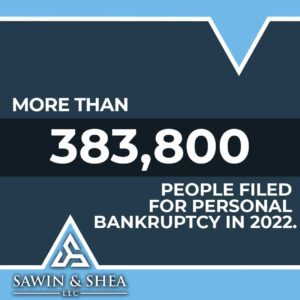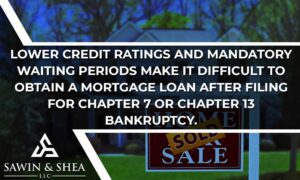
One of the most common questions from those who file for Chapter 7 or Chapter 13 bankruptcy is, “Can I buy a house after bankruptcy?” and “After bankruptcy discharge, when can I buy a house?”
In short, yes, you will be able to purchase a home after bankruptcy. The amount of time after filing that you can purchase a house depends. Read on to learn more.
Mortgage lenders understand that people file for bankruptcy for complex reasons. Consumers aren’t always at fault. It’s also common! More than 383,800 people filed for personal bankruptcy in 2022. In addition:
- 62% of bankruptcies are related to medical debt and collection.
- 92% of people who file for bankruptcy never file again.
That is why mortgage lenders are often willing to work with you to provide a loan after bankruptcy.
However, you’ll need to take specific steps to get the loan. Those steps will depend on your situation and the type of loan you seek.

Lower credit ratings and mandatory waiting periods make it difficult to obtain a mortgage loan after filing for Chapter 7 or Chapter 13 bankruptcy. Mortgage lenders typically examine your credit reports, credit rating, and bankruptcy discharge details before making loan decisions.
Can I Buy a House 2 Years After Bankruptcy? Waiting Periods and Credit Ratings for Post-Bankruptcy Conventional Loans
If you filed for Chapter 7 bankruptcy, you must wait at least four years after a court discharges or dismisses your bankruptcy to qualify for a conventional loan.
For Chapter 13 bankruptcy, you’ll need to wait at least four years after a court has dismissed it before applying for a mortgage. If the court discharged your bankruptcy, you must wait at least four years from the filing date and two years after dismissal before applying for a conventional loan. A conventional loan usually requires a credit rating of at least 620.
How Long After Bankruptcy Can I Buy a House? Waiting Periods and Credit Ratings for Government-Backed Mortgage Loans
Government-backed mortgage loans usually have shorter waiting periods. If you filed for Chapter 7, the waiting period is generally three years after your bankruptcy’s discharge for a U.S. Department of Agriculture loan and two years for an FHA or VA loan. For Chapter 13 bankruptcy, USDA loans have a one-year waiting period if you’ve had a discharge. FHA and VA loans require a court to discharge your case before applying.
With an FHA loan, you can buy a home with a credit score as low as 580 points with 3.5 percent down and only 500 with a 10 percent down payment.
What You Can Do to Improve Your Credit
One of the ways to get ready to take out a mortgage loan is to improve your credit. These are some ways to do that:
- Pay your bills on time. If you don’t remember to do so, set up an auto-pay system.
- Open a secured credit card, which is possible even after you’ve filed for bankruptcy. These types of credit cards require you to place a deposit with your credit card company. Make sure the card that you apply for reports to credit reporting agencies. Once you open it, make your payments on time every month.
- Check your free credit reports regularly for errors and dispute any you find.
- Don’t take on any excessive unsecured debt.
- Get pre-approved for a mortgage to show the buyer you are prepared.
- Write a bankruptcy explanation letter to give your lender details about why you declared bankruptcy, including any steps to avoid it.
Sawin & Shea: Indiana Bankruptcy Attorneys
The attorneys at Sawin & Shea provide compassionate bankruptcy representation for clients from Indianapolis and surrounding areas. Our team has a combined 75 years of experience, and we can help you get the fresh start you deserve. We can also get you in a strong position for the future, including future mortgage loans. Contact us at 317-759-1483 or send us an email for a free consultation today!



